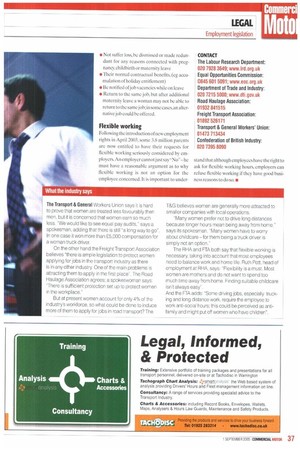What the industry says The Transport & General Workers Union
Page 37

If you've noticed an error in this article please click here to report it so we can fix it.
says it is hard to prove that women are treated less favourably then men, but it is concerned that women earn so much less. "We would like to see equal pay audits," says a spokesman, adding that there is still "a long way to go". In one case it won more than £5,000 compensation for a woman truck driver.
On the other hand the Freight Transport Association believes "there is ample legislation to protect women applying for jobs in the transport industry as there is in any other industry One of the main problems is attracting them to apply in the first place". The Road Haulage Association agrees; a spokeswoman says: "There is sufficient protection set up to protect women in the workplace."
But at present women account for only 4% of the industry's workforce, so what could be done to induce more of them to apply for jobs in road transport? The T&G believes women are generally more attracted to smaller companies with local operations.
"Many women prefer not to drive long distances because longer hours mean being away from home," says its spokesman. "Many women have to worry about childcare — for them being a truck driver is simply not an option."
The RHA and FTA both say that flexible working is necessary, taking into account that most employees need to balance work and home life. Ruth Pott, head of employment at RHA, says: "Flexibility is a must. Most women are mothers and do not want to spend too much time away from home. Finding suitable childcare isn't always easy".
And the FTA adds: Some driving jobs, especially trucking and long distance work, require the employee to work anti-social hours; this could be perceived as antifamily and might put off women who have children".




































































































































































































